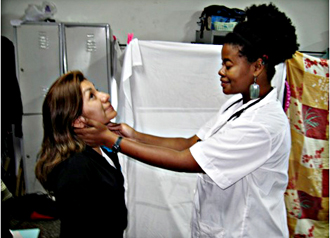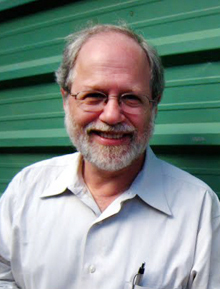Professor Studies Health Care of Cuba
As the debate over U.S. health care continues, a Tulane School of Medicine professor is contemplating lessons from a research trip to Cuba. Dr. Rick Streiffer joined 14 medical educators who observed Cuba's healthcare system, including medical students working in clinics and a hospital.

In a Cuban clinic, Tia Tucker, right, examines a patient. Tucker is a Tulane public health alumna attending medical school in Havana. (Photo from Tia Tucker)
Streiffer, professor and chair of the Department of Family and Community Medicine, calls his experience in Cuba “eye-opening.”
“Cuba has made tremendous progress in the delivery of health care and hence the health status of its people in the last 50 years,” Streiffer says.
For the first half of the 20th century, the Cuban citizens suffered and died from “Third World illnesses” such as malnutrition, malaria, diarrhea and other infectious diseases, says Streiffer.
“Today,” he says, “with 100 percent universal access to care, the highest physician-to-population ratio in the world, and a system that has 70 percent primary care doctors, those diseases no longer dominate, and people live longer than we do in the U.S.”
Cuba also trains thousands of physicians from other countries at no cost to the trainees or their countries.

Dr. Rick Streiffer toured Cuba with medical educators to observe its healthcare system. (Photo from Dr. Rick Streiffer)
“The only obligation of those trainees being to return to their own country to practice in an underserved community,” says Streiffer.
Cuba's model of both medical training and primary practice is a melding of public health, social and behavioral sciences and medicine, he says. He relates an encounter with a maternal/fetal medicine specialist who practiced 20 years in a hospital setting. For the last five years, however, the obstetrician has seen patients in a neighborhood clinic.
“He told me that it was so much smarter to prevent these problems in partnership with the family doctor than wait until the patients come to the hospital in crisis.”
Streiffer's tour of Cuba was part of an effort led by Medical Education Cooperation With Cuba, a nonprofit advocacy organization that works to improve health outcomes in the U.S. and developing countries.
